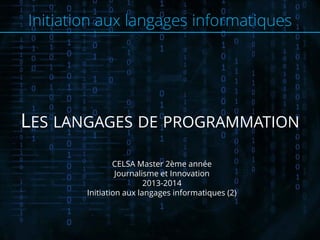
Les langages de programmation
- 1. Initiation aux langages informatiques LES LANGAGES DE PROGRAMMATION CELSA Master 2ème année Journalisme et Innovation 2013-2014 Initiation aux langages informatiques (2)
- 2. INTRODUCTION – Brève histoire des langages informatiques – Les différents types de langages par usage (programmation, accès aux données, présentation) – Les différents styles de langage (impératifs, objets, script…) – Syntaxe et grammaire d'un langage informatique CELSA – Master 2ème année 2013-2014 2Initiation aux langages informatiques (2) Initiation aux langages informatiques
- 3. • Brève histoire des langages informatiques • Les différents types de langages par usage (programmation, accès aux données, présentation) • Les différents styles de langage (impératifs, objets, script…) • Syntaxe et grammaire d'un langage informatique CELSA – Master 2ème année 2013-2014 3Initiation aux langages informatiques (2) Initiation aux langages informatiques
- 4. La préhistoire • 1801 : Joseph Marie Jacquard, 1er langage binaire [1G] • 1842 : Ada Lovelace écrit le 1er programme (sans ordinateur) • 1950 : langage assembleur [2G] • 1954 : Fortran [3G] CELSA – Master 2ème année 2013-2014 4Initiation aux langages informatiques (2) Histoire des langages informatiques
- 5. • 1960 : COBOL • 1964 : BASIC • 1970 : Pascal, SQL • 1973 : C CELSA – Master 2ème année 2013-2014 5Initiation aux langages informatiques (2) Histoire des langages informatiques
- 6. • 1980 : Smalltalk • 1983 : C++ • 1986 : Objective-C • 1991 : Python, Visual basic • 1993 : HTML • 1995 : PHP, Delphi, Java, Ruby • 1996 : UML CELSA – Master 2ème année 2013-2014 6Initiation aux langages informatiques (2) Histoire des langages informatiques
- 7. • 2000 : C# • 2003 : Scala, Groovy • 2009 : Go • 2011 : Dart • 2012 : TypeScript CELSA – Master 2ème année 2013-2014 7Initiation aux langages informatiques (2) Histoire des langages informatiques
- 8. Bilan • 4 générations 1. Langage machine 2. Langage assembleur 3. Langage de haut niveau 4. L4G / modélisation 5. L5G • +2500 langages CELSA – Master 2ème année 2013-2014 8Initiation aux langages informatiques (2) Histoire des langages informatiques
- 9. • Brève histoire des langages informatiques • Les différents types de langages par usage (programmation, accès aux données, présentation) • Les différents styles de langage (impératifs, objets, script…) • Syntaxe et grammaire d'un langage informatique CELSA – Master 2ème année 2013-2014 9Initiation aux langages informatiques (2) Initiation aux langages informatiques
- 10. • Langages de programmation – Procéduraux (COBOL, C…) – Fonctionnels (Haskell) • Langages d’accès aux données – Requête (SQL) • Langages de description – Données (XML) – Balisage (HTML) – Interface (XAML) CELSA – Master 2ème année 2013-2014 10Initiation aux langages informatiques (2) Les types de langages
- 11. • Brève histoire des langages informatiques • Les différents types de langages par usage (programmation, accès aux données, présentation) • Les différents styles de langage (impératifs, objets, script…) • Syntaxe et grammaire d'un langage informatique CELSA – Master 2ème année 2013-2014 11Initiation aux langages informatiques (2) Initiation aux langages informatiques
- 12. Paradigmes • Impératifs – Séquences d’nstructions – Langages machine, assembleurs – Langages procéduraux (Cobol, C…) • Fonctionnels – Problème + contraintes – Lisp, Haskell • Orientés objet – Objet comprend les données et les traitements – Simula, C++, Java… CELSA – Master 2ème année 2013-2014 12Initiation aux langages informatiques (2) Les styles de langages
- 13. • Brève histoire des langages informatiques • Les différents types de langages par usage (programmation, accès aux données, présentation) • Les différents styles de langage (impératifs, objets, script…) • Syntaxe et grammaire d'un langage informatique CELSA – Master 2ème année 2013-2014 13Initiation aux langages informatiques (2) Initiation aux langages informatiques
- 14. Hello World http://www.roesler-ac.de/wolfram/hello.htm CELSA – Master 2ème année 2013-2014 14Initiation aux langages informatiques (2) Syntaxe et grammaire
- 15. Questions ? Email: pierre@tran.net Twitter : @PierreTran CELSA – Master 2ème année 2013-2014 15Initiation aux langages informatiques (2)
